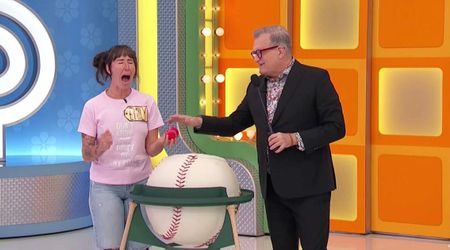'Antiques Roadshow' guest says 'holy smokes' after expert reveals the value of her Olympic collection

Most guests on "Antiques Roadshow" bring heirlooms passed on to them by elders, while they know little of their origins. But once in a while, relatives of well-known personalities or people who knew them bring items that they know all about, but are still astonished by their true value. American discus thrower Al Oerter is rightfully deemed an Olympic legend for his extraordinary athletic feat. He won four consecutive Olympic gold medals between 1956-68, breaking and setting a new record each time in the discus throw. He achieved the distinction of being the first athlete to throw beyond 200 feet (61 meters) in 1962, according to the Olympics official site. Despite knowing all this, when one of his daughters presented his Olympic Collection on "Antiques Roadshow" for appraisal, she was stunned and exclaimed, "Holy smokes!" Gushing about her father's legacy, the guest said, "We just love talking about our dad. Many people don't know about him because discus, who knows about discus? So, to kind of bring it up again is really a great feeling."
"We brought in my dad's four Olympic gold medals, and some memorabilia, and a discus. He won four consecutive gold medals in discus in '56, '60, '64 and '68, so we had those medals," she continued. She then went on to give a brief sports history about her father's medals, "Each medal really did represent something, like his first medal, he was way too young, shouldn't have been there, but he won. And then in two other games, he was injured, shouldn't have been there, and he won. And in 68, he kidded around saying he was too old and shouldn't have been there, but he won," she nostalgically recalled.
Oerter's journey as a legendary Olympian was, however, marred by several serious injuries. Right before competing in the 1960 Olympics, he met with a devastating accident, which required him to wear a neck brace to protect his injured cervical disc. As a result of intense training, he tore a rib muscle just before the Tokyo games. Not heeding medical advice, the ace sportsman turned during the game, wearing a neck brace and carrying ice packs. He set a new record that day and also won his third gold. However, the strenuous effort messed with his physical capacity as a player. Oerter had to be lifted off the field, thus ending his chance to compete in the sixth and final throw.

Oerter retired from the game in 1968 and took over the management side of the sports. An abstract artist himself, he also co-founded the Art of the Olympians program, an initiative that promoted artworks of fellow Olympians. Coming back to his memorabilia, his daughter never imagined that they would be valued so highly by Leila, an antique appraiser. "I was really hoping I would get Leila because I've seen her on the show, and she's so enthusiastic, and so freaking smart. And when she walked in and walked to our table, I was so excited," Oerter's daughter exclaimed.
After evaluating the history and the condition of the Olympic collection, the appraiser revealed the value. "I would place an insurance value on the whole collection here at $400,000," she said. "Are you kidding? Holy smokes. Wow, that's impressive. Wow," the Olympian's daughter reacted. "We are going to put them back in a safe and not let kids play with them anymore," the guest concluded.




















